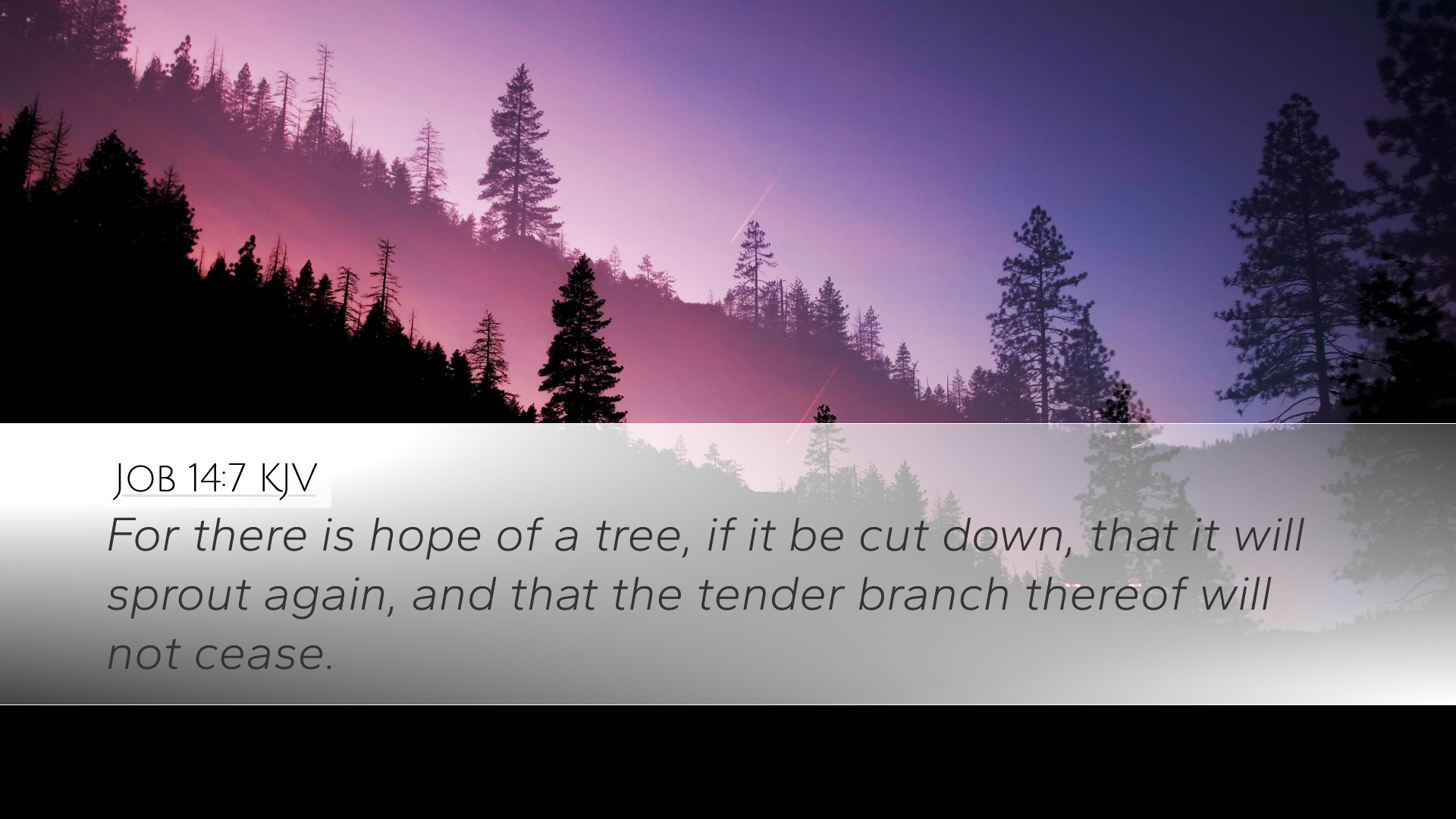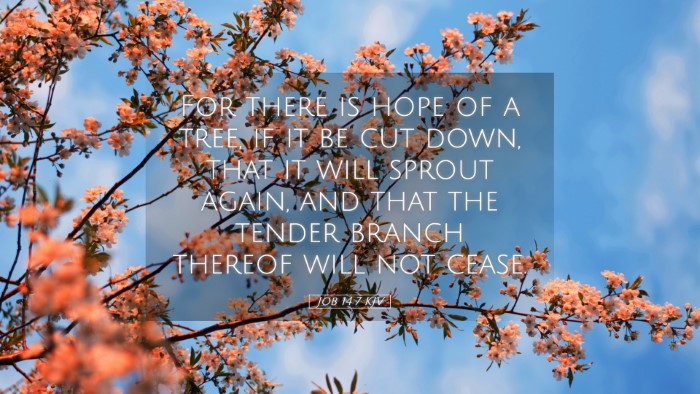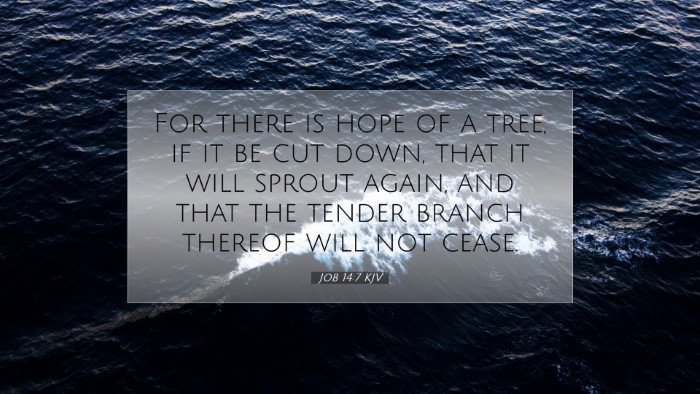Old Testament
Genesis Exodus Leviticus Numbers Deuteronomy Joshua Judges Ruth 1 Samuel 2 Samuel 1 Kings 2 Kings 1 Chronicles 2 Chronicles Ezra Nehemiah Esther Job Psalms Proverbs Ecclesiastes Song of Solomon Isaiah Jeremiah Lamentations Ezekiel Daniel Hosea Joel Amos Obadiah Jonah Micah Nahum Habakkuk Zephaniah Haggai Zechariah MalachiJob 14:7
Job 14:7 KJV
For there is hope of a tree, if it be cut down, that it will sprout again, and that the tender branch thereof will not cease.
Job 14:7 Bible Commentary
Commentary on Job 14:7
Verse: "For there is hope for a tree, if it be cut down, that it will sprout again, and that its tender branch will not cease." (Job 14:7, ESV)
Introduction
The Book of Job is a profound exploration of suffering, faith, and divine justice. Job 14:7 presents a poignant metaphor about hope and renewal embedded in the context of human mortality and despair. This verse serves as a reminder of the resilience found in nature and the underlying theme of hope amid suffering.
Contextual Background
Job, a man of great wealth and righteousness, experiences catastrophic loss and suffering, leading him to question the justice of God. As he grapples with his afflictions, he often reflects on the nature of life, death, and the possibility of hope beyond despair. Job 14 is a pivotal chapter that addresses the transient nature of human life and the inevitability of death.
Verse Analysis
- Hope in Nature: Job invokes the image of a tree that, though cut down, possesses the potential for new life. This metaphor emphasizes the idea that life can emerge from what appears to be finality.
- Symbol of Resurrection: The tree's ability to sprout again symbolizes not just hope for the individual, but the broader theological implication of resurrection. This idea can resonate with Christian interpretations of hope in eternal life and redemption.
- Human Mortality: The reference to the tree also illuminates the transient nature of human existence. Unlike the tree that can sprout new life, human beings face a definitive end, which resonates with Job's contemplations on mortality.
Insights from Public Domain Commentaries
Matthew Henry
Matthew Henry, in his commentary on the whole Bible, emphasizes the concept that although a tree may be cut down, it has the potential to regenerate—an attribute he finds deeply rooted in God’s creation. He notes, "This comparison reminds us that God can restore what seems lost." Henry points to the mercies of God, suggesting that humans, through repentance and faith, can find hope and renewal, just as the tree can sprout again.
Albert Barnes
Albert Barnes, in his commentary on the Book of Job, underscores the hope imbued in the metaphor of the tree. He explains, "The point is, that there is a sense in which the cutting down of the tree may be only a temporary event, as God can enable it to live again." Barnes advances the theme of divine restoration, suggesting that God's dealings with humanity, though often shrouded in mystery, are ultimately governed by grace and the potential of rebirth, paralleling the natural world to human experiences.
Adam Clarke
Adam Clarke addresses the philosophical implications of the verse, positing that Job’s analogy of the tree signifies a glimmer of hope regarding human fate. He refers to the distinct variations in life and death that each creature experiences. Clarke writes, "If the tree can live again, the question posed is whether man, who possesses a divine spark, can hope for a similar restoration?" The intricacies of Clarke's commentary revolutionize the applicability of Job’s lament into a broader discussion about life after death and the potential for transformation.
Application for Today
This verse carries enormous significance for contemporary audiences. Pastors can use Job 14:7 to encourage congregants facing despair, instilling hope that God can regenerate lives much like the tree springs forth anew. For students and theologians, this scripture invites deep reflection on the intersection of nature, divinity, and human experience.
- Hope in Adversity: This verse serves as a profound reminder that amidst life's trials and tribulations, hope exists. The comparison between the tree and human life prompts a deeper understanding of resilience.
- Theological Reflection: For scholars, Job 14 offers a gateway to discuss eschatology and the resurrection. The cyclic principles observable in nature can encourage a theological dialogue regarding God's plans for humanity.
- Nature as a Reflection of God’s Character: The regenerative properties present in nature can be seen as a manifestation of God’s grace and mercy, reinforcing the belief that He is the source of renewal.
Conclusion
Job 14:7 stands as a powerful testament to hope beyond despair. As a congregation, we can find solace in the truth that our struggles may lead to new life and that faith can spring forth even from the most barren circumstances. The insights gleaned from the timeless commentaries of Henry, Barnes, and Clarke provide valuable tools for understanding the intricate web of suffering, divine compassion, and the prospects of life and renewal. In reflection, let us embrace the hope that God offers through His creation, just as the tree, once cut down, may rise again to bear fruit.


